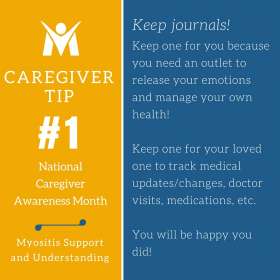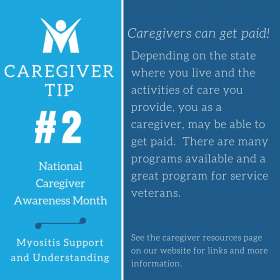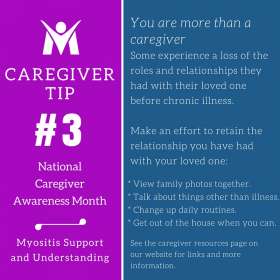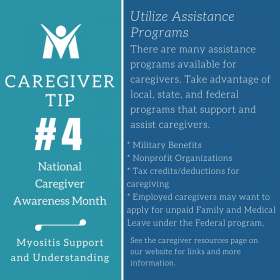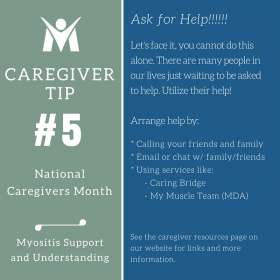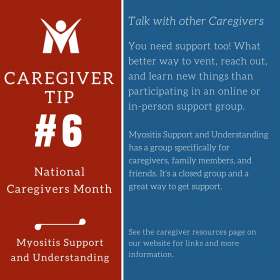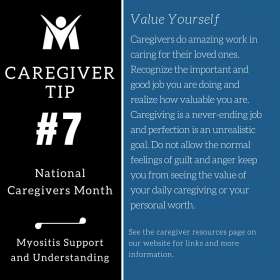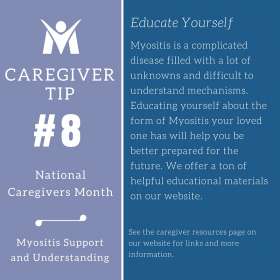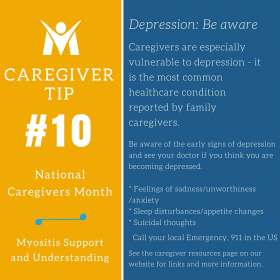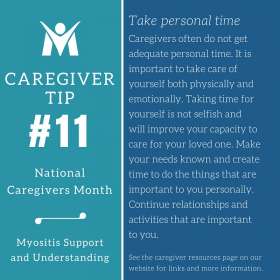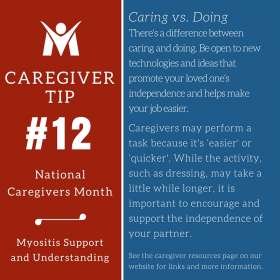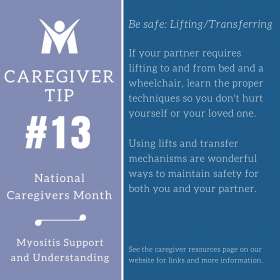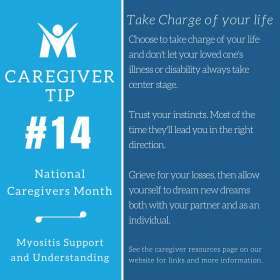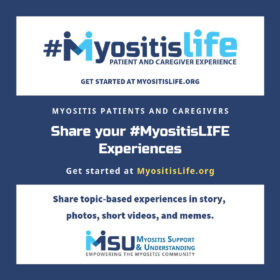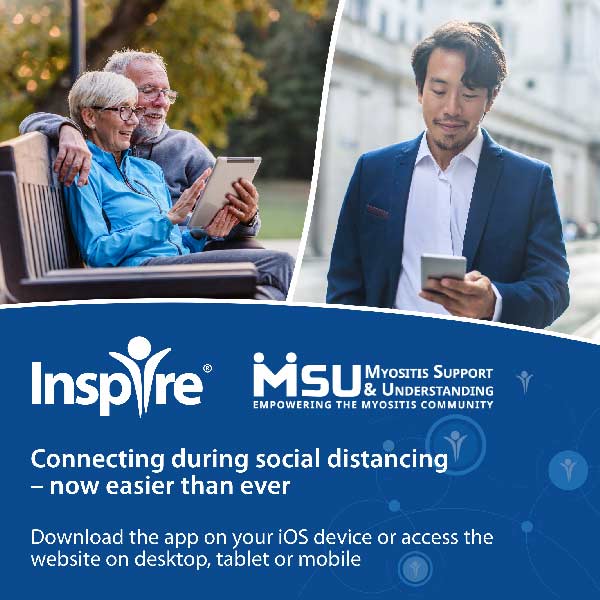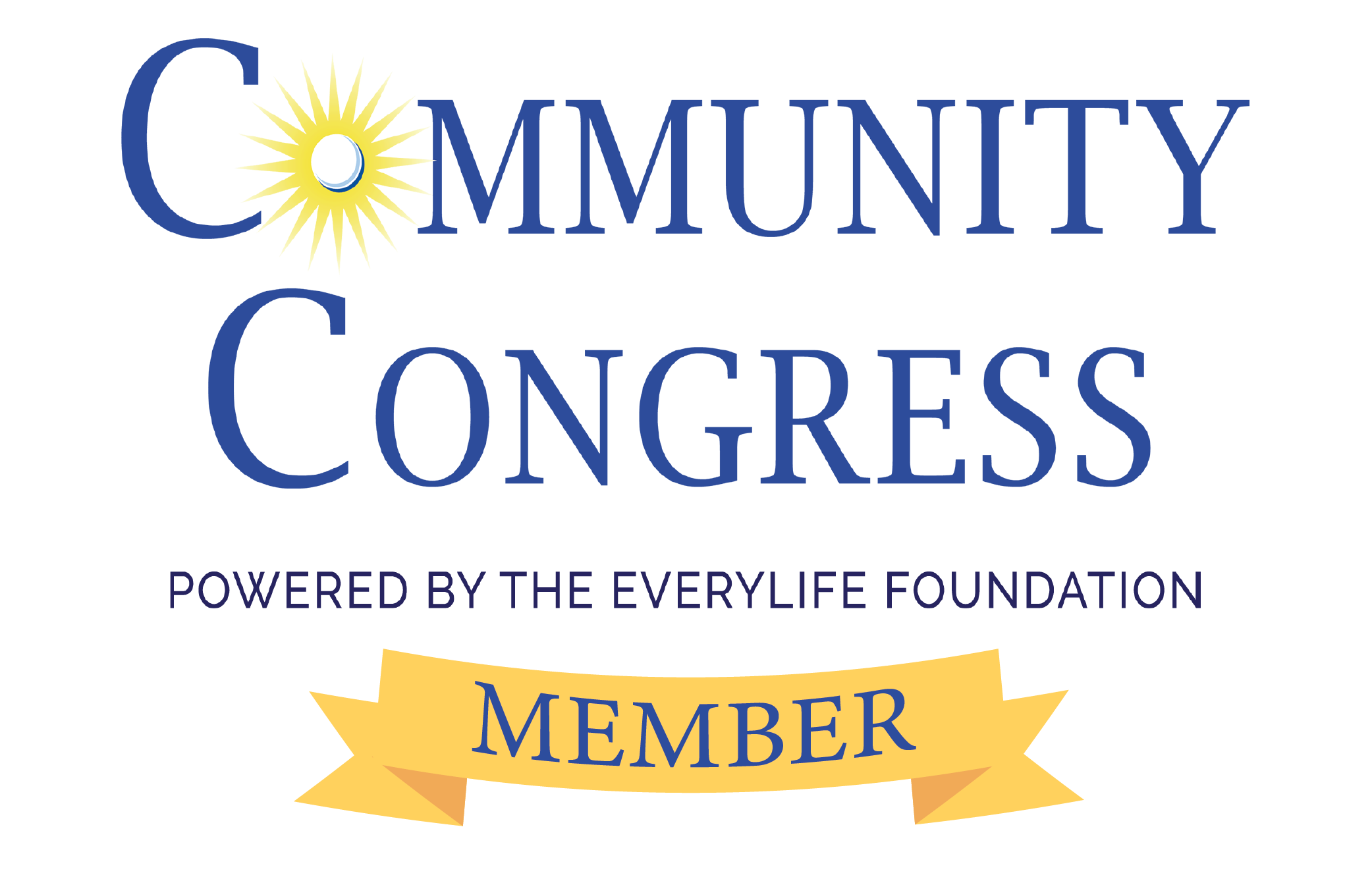Myositis Caregivers and Care Partners
Caregivers and Care Partners play an important and ever-evolving role in the lives of those living with myositis. As a caregiver, you likely have many questions and concerns. We are continuing to grow a vast network of education, support, and resources just for you.
Our myositis caregivers allow us, as patients, to live our best possible lives.
Educate Yourself
Knowledge is Power. Learning more about myositis is a great first step in your role as a caregiver.
Myositis refers to the Idiopathic Inflammatory Myopathies (IIM’s), which is a group of rare, systemic, incurable autoimmune muscle diseases.
Learn more about the different types of myositis.
- Dermatomyositis (DM)
- Clinically Amyopathic Dermatomyositis (CADM)
- Polymyositis (PM)
- Inclusion Body Myositis (IBM)
- Immune-Mediated Necrotizing Myopathy (IMNM)
- Antisythetase Syndrome (AS)
- Juvenile Myositis (JM/JDM)
- Orbital Myositis (OM)
Tools and Resources to help you
There are many common questions that arise for caregivers and care partners. One common question is, “How do I explain myositis to others?”
We have put together some helpful tools, resources, and downloads for patients and caregivers.
Other helpful resources
Learn about Clinical Trials
There are currently no FDA approved treatments available for myositis. Treatments used were created for other purposes and are used to treat various autoimmune diseases.
Participating in a clinical trial or research study can help in many ways. Talk with your loved one about clinical trials currently available. Easily locate trials using the clinical trials match program provided in partnership with Antidote Technologies.
Get Support
Caregivers for those with myositis often feel very lonely. But, you are NOT alone! We have several caregiver support options to help you in this difficult role.
- Join our Myositis Support Community
Myositis Caregivers – Join us for 24/7 support. Connect with other myositis caregivers dealing with the same questions and concerns as you. It’s easy and free. Join today at Myositis.Inspire.com
- Join our Facebook Caregivers, Family, and Friends Support Group
If you are on Facebook, request to join our group specifically for myositis caregivers, family members, and friends. Be sure to answer all questions when requesting to join. Join today.
Affirmations to help you get through the month
Barbara Deer, a spouse and caregiver of a patient with polymyositis, has provided us with a day-by-day listing of caregiver affirmations that can help caregivers focus on themselves and realize how special they are, and our wish for them to care for themselves. Caregivers have always been a huge part of MSU and continue to be leading players in how we move forward.
Download the affirmations in a PDF file and/or download the daily graphics you can print and share with others.
Caregiver Tips
You may be able to get paid as a caregiver
Depending on the state where you live and the activities of care you provide, you as a caregiver may be able to get paid.
There are many programs available and great programs for service veterans. See our veterans resources page.
You are MORE than a caregiver
Some people experience a loss of the roles and relationships they had with their loved one before chronic illness. Make an effort to retain the relationship you have had with your loved one:
- View family photos together.
- Talk about things other than illness.
- Change up daily routines.
- Get out of the house when you can
Utilize Assistance programs
There are many assistance programs available for caregivers. Take advantage of local, state, and federal programs that support and assist caregivers.
- Military Benefits
- Nonprofit Organizations
- Tax credits/deductions for caregiving
- Employed caregivers may want to apply for unpaid Family and Medical Leave under the Federal program.
Ask for Help
Let’s face it, you cannot do this alone. There are many people in our lives waiting to be asked to help. Utilize that help!
Arrange help by:
- Calling your friends and family
- Email or chat w/ family/friends
- Use a service like:
- CaringBridge (CaringBridge.org)
Talk with other caregivers
You need support, too! What better way to vent, reach out, and learn new things than participating in an online or in-person support group.
Myositis Support and Understanding has an online group specifically for caregivers, family members, and friends. It’s a closed group and a great way to get support.
Request to join using the link below. This group is not for patients.
Value Yourself
Caregivers do amazing work caring for their loved ones. Recognize the important job you are doing and realize how valuable you are.
Caregiving is a never-ending job and perfection is an unrealistic goal. Do not allow the normal feelings of guilt and anger keep you from seeing the value of your daily caregiving.
Educate Yourself
Myositis is a complicated disease filled with a lot of unknowns and difficult to understand mechanisms. Educating yourself about the form of Myositis your loved one has will help you be better prepared for the future.
We offer helpful educational materials on our website. Start by visiting the Myositis section.
Learn to manage stress
Stress is one thing you will definitely experience as a caregiver. There are several ways to help you manage stress. Some options are:
- Professional Counseling
- Do creative things you enjoy
- Set limits and expectations
- Attend family events
- Talk to a friend you can trust
Depression: Be Aware
Caregivers are especially vulnerable to depression – it is the most common healthcare condition reported by family caregivers. Be aware of the early signs of depression and see your doctor if you think you are becoming depressed.
- Feelings of sadness/unworthiness/anxiety
- Sleep disturbances/appetite changes
- Suicidal thoughts
Call your local Emergency, 911 in the US, or contact the National Suicide Prevention Lifeline – www.suicidepreventionlifeline.org/ – 1-800-273-TALK (8255)
Take personal time
Caregivers often do not get adequate personal time. It is important to take care of yourself both physically and emotionally. Taking time for yourself is not selfish and will improve your capacity to care for your loved one.
Make your needs known and create time to do the things that are important to you personally. Continue relationships and activities that are important to you.
Caring vs. Doing
There’s a difference between caring and doing. Be open to new technologies and ideas that promote your loved one’s independence and help you do your job easier.
Caregivers may perform a task because it’s ‘easier’ or ‘quicker’. While the activity, such as dressing, may take a little while longer, it is important to encourage and support the independence of your partner.
Take charge of your life
Choose to take charge of your life, and don’t let your loved one’s illness or disability always take center stage.
Trust your instincts. Most of the time they’ll lead you in the right direction.
Grieve for your losses, then allow yourself to dream new dreams both with your partner and as an individual.
Share your experiences to empower other caregivers
Myositis caregivers and care partners each have unique experiences to share that can help others going through similar situations. Whether they are specific adaptations you have made in your home or daily life to help make thing easier or how you have created a journal or schedule that helps keep your better organized and prepared for unexpected circumstances. Share your unique story with us so we can share it publicly.
Caregiver Quotes and Inspiration
“In most families, care-giving becomes the woman’s responsibility. While care-giving can enrich you, it can also deplete you if you don’t have support or make time for self care.” – Kathleen A. Kendall-Tackett
“One goal of the mindful caregiver is to find ways to not feel ‘dis-eased’ in the caregiving process.” ― Nancy L. Kriseman, The Mindful Caregiver: Finding Ease in the Caregiving Journey
“My caregiver mantra is to remember: the only control you have is over the changes you choose to make.” ― Nancy L. Kriseman, The Mindful Caregiver: Finding Ease in the Caregiving Journey
“Happiness is an attitude. We either make ourselves miserable, or happy and strong. The amount of work is the same.” — Francesca Reigler

